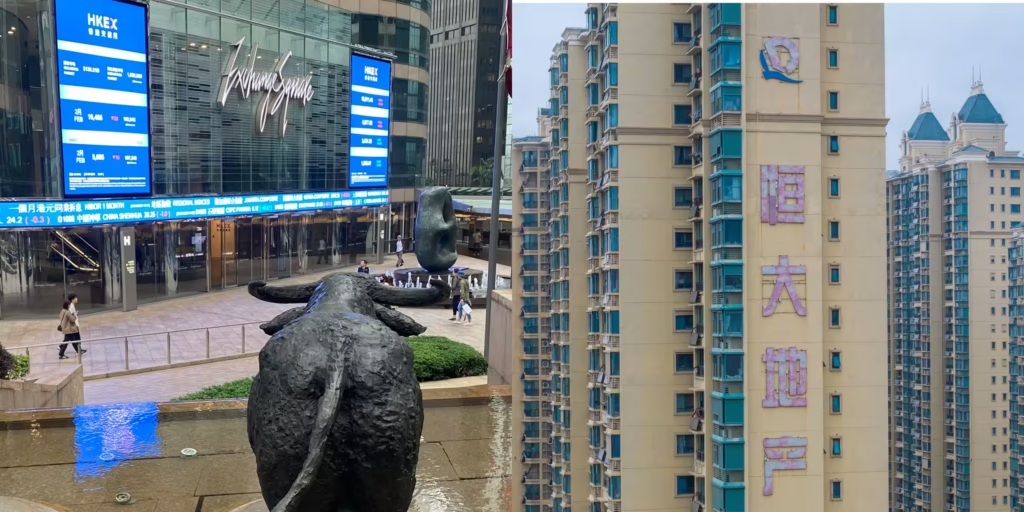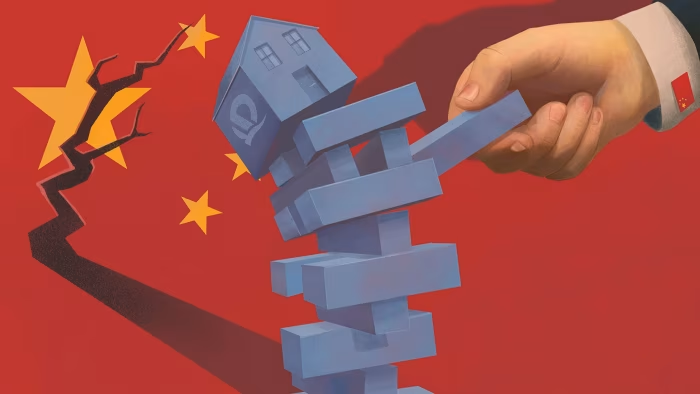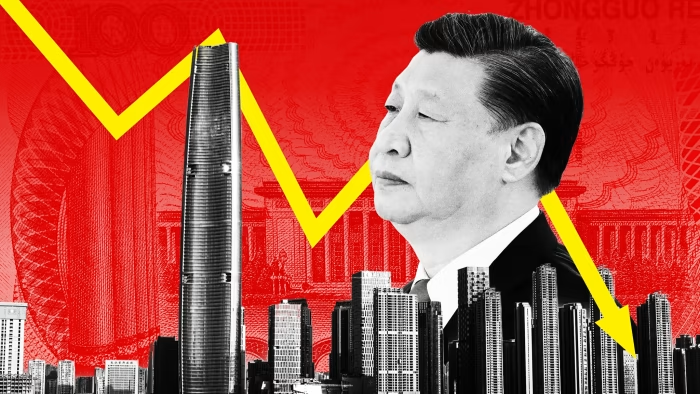On August 25th, 2025, China’s real estate titan, Evergrande, will be officially delisted. But how does a massive company like this fall apart? Is the housing market crashing? And what does it mean for billionaires, the economy, and YOU?
This isn’t just about a company folding—it’s about the BIGGEST shakeup in real estate, politics, and money you’ve ever seen. Want the truth behind this shocking collapse? Keep reading… this will blow your mind.

Table of Contents
Free Housing or Just a Pipe Dream?

- Since 1949, China has been giving urban workers free housing.
- But hold on, it wasn’t really as “free” as it sounds.
- The government or affiliated groups built these houses, and workers could use them without paying rent.
- If you were single, you got a studio. If you had a family, you got a two-bedroom apartment – based on what you needed, of course.
- The housing was owned by the state or the organization the worker belonged to, and workers got to live there as long as they were employed.
- Think of it like a workplace dormitory, but with more paperwork.
- Sounds good, right? Free housing! But the catch was that the quality was poor, and there was never enough to go around. Complaints? Oh, they were growing by the day.
1998: The Big Shift – Let’s Get Real (Estate)

- Fast forward to 1998. The government, led by Jiang Zemin, dropped the bomb: “Housing is a commodity to be bought and sold. The free system? Gone.”
- The goal was clear: reduce the burden on state-owned companies and get people to own their homes, making the construction industry a major economic driver.
- China was just about to explode in growth, and the middle class was expanding like never before.
- People wanted their own homes, the government was backing them up, and the banks were saying, “Hey, we’ve got loans for you!”
- On top of that, local governments jumped in, eager to cash in by selling land rights. It was a recipe for a housing boom.

Land: You Can Own the Building, But Not the Dirt
- The government said, “Sure, own the house, but the land under it? That’s ours.”
- The land stayed in the government’s hands, but you got a 100-year lease to build on it. You could own the house, though.
- Local governments started making big bucks by selling the rights to use this land.

Enter Evergrande: The Affordable Housing Hero

- In 1998, when the market first shifted, new developments were often luxurious… and let’s be honest, too pricey for most people.
- Then, Xu Jiayin—who had moved to the big city to work in real estate—spotted his chance.
- He started “Evergrande,” which roughly translates to “Forever Big,” and began building affordable homes that regular folks could actually afford.
Evergrande’s Rise: From Factory Sites to City Sights

- Evergrande’s first project was pretty humble: apartments on an old factory site.
- Xu Jiayin had zero funds to start, but somehow, he made it happen.
- He took out a loan from the bank, bought the land rights, and started pre-selling apartments before construction even began.
- Evergrande was a game-changer. In China, developers and builders are often the same company, unlike in some countries where those roles are separated.
- Evergrande’s affordable apartments hit a sweet spot for the new, rising middle class.

Success on the First Day: Evergrande’s Jackpot
- Evergrande’s first property 100% sold out on its very first day—talk about a success story.
- But here’s the twist: Evergrande didn’t use the pre-sale deposits to actually build the apartments.
- They rolled out 13 more projects at once, using the money from one to fund the next, and just like that, Evergrande started booming.
- By 2018, Evergrande had grown into the world’s largest real estate company.
- Xu Jiayin became China’s wealthiest person, with assets totaling over 50 trillion won. Yeah, you read that right.

Evergrande’s Secret Sauce: Political Donations
- But here’s where things got messy: Evergrande kept handing out huge political donations to China’s political factions—especially the Communist Youth League and the Shanghai clique.
- But then, Xi Jinping took the reins.
- And from his perspective, Evergrande was the poster child for corruption, funding illegal political donations.
- So, naturally, Evergrande became a target for stricter regulations and even some administrative penalties.

The Three Red Lines: Evergrande’s Financial Tightrope

- Enter the “Three Red Lines” policy—a set of new rules for real estate companies.
- The Three Red Lines were:
- 1) Debt-to-equity ratio above 70%
- 2) Net debt ratio above 100%
- 3) Short-term debt exceeding the company’s capital. If you broke them, no new loans.
- Yep, Evergrande managed to break all three lines.
- Banks, which had lent Evergrande tons of money, suddenly refused to extend loan deadlines and started demanding immediate repayment.
- It wasn’t just the banks; local governments also got involved and started taking action.
Hainan Disaster: Evergrande’s Big Fail

- In December 2021, Danzhou City in Hainan ordered Evergrande to tear down 39 apartment buildings on an artificial island they were building.
- These buildings, almost finished, contained 2,700 units worth 1.5 trillion yuan. The government claimed they violated urban planning laws.
- Evergrande had to refund the deposits or offer nearby apartments to buyers, resulting in a loss of 1.5 trillion yuan.
- But after Evergrande made things right with the buyers, the government reversed the demolition order, only to seize all 39 buildings.
The Evergrande Financial Meltdown and the Domino Effect

- Evergrande lost 1.5 trillion yuan, handing over the buildings to the government without getting a penny in return.
- While Evergrande had assets, the banks refused to extend loans, and the government kept pushing them to the edge.
- The fall of Evergrande didn’t just affect them—it set off a chain reaction throughout China’s real estate sector.
- The “Three Red Lines” policy started to take down other real estate companies, drying up their operating funds.
- By 2022, more real estate companies were running into negative cash flows.
Evergrande’s Assets: All Show, No Go
- Evergrande may have had tons of assets, but here’s the kicker—most of it was tied up in land owned by the government.
- And the debt? Almost all of it was owed to state-owned banks.
- If Evergrande went under, the state-owned banks would face massive losses, and local governments would be left with unfinished buildings.
- Up until now, China’s growth has been powered by infrastructure investments made by the central government, while local governments relied on real estate development to survive.
- Local governments focused on real estate development as the easiest way to hit the growth targets set by the central government.
- That led to some fierce competition between local governments.
- Plus, China didn’t have property taxes like other countries, which led to a boom in real estate development that outpaced actual demand.

The Real Estate Crisis: An Economic Ticking Time Bomb
- As regulations tightened, the real estate market began to slow down fast.
- The liquidity crisis for real estate companies meant they couldn’t fund new projects, and it started affecting other industries as well.
- Unlike other countries, China’s real estate deals are structured around deposits paid at different stages of construction.
- When developers ran out of money, they used the pre-sale deposits to cover the shortfalls. But that was a temporary fix—one that ran out fast.
- With 2 million homes still unfinished and 400 trillion yuan in construction costs, the situation was getting desperate.

Local Government Debt: The Zero-COVID Toll
- As real estate companies faced struggles, local governments also found themselves under financial pressure.
- Around 46% of local government revenue comes from selling land-use rights to private real estate companies.
- With fewer homes being sold, revenue from land sales dried up, leading to budget shortfalls.
- The financial strain was made worse by the Zero-COVID policy, which forced local governments to cover the costs of daily PCR tests and other quarantine expenses.

Shifting Gears: Ending Zero-COVID and Facing Economic Reality
- Eventually, China ended its Zero-COVID policy—not just because people were unhappy, but because local governments couldn’t afford it anymore.
- Up until now, China’s impressive growth has been largely fueled by infrastructure investments from local governments.
- But now, with mounting debt, local governments are struggling to maintain those investment levels, and the economy is slowing down.
- The Communist Party of China has a well-known strategy: delay the tough problems and hope they get solved by themselves.
- The government hoped that delaying the bankruptcy of real estate companies would allow the economy to bounce back and the real estate sector to recover.
- But, as we’re learning, delaying only works for so long.

Evergrande’s Collapse: The Road Ahead
- Evergrande has racked up 146 trillion yuan in losses over the past two years, and the debt keeps growing.
- By August 25, 2025, Evergrande will be officially delisted from the stock exchange.
- The next step? The nationalization of major real estate companies like Evergrande, Wanda, and Country Garden.
- The government could take these companies over, pump in state funds to revive the market, and stabilize the economy.
- This would be a way to ease public anger—forcing the owners to surrender their wealth and calming the masses.
- To save the real estate sector, the government will likely lower interest rates, relax lending criteria, and offer tax breaks to developers.

The Economic Struggle: Deflation, Currency Devaluation, and Uncertainty

- China isn’t dealing with inflation right now—prices are either stagnant or falling.
- The Consumer Price Index (CPI) is barely moving, stuck at zero, causing concerns about deflation.
- In response, the government is slashing interest rates and injecting liquidity to try and revive the economy.
- As they lower interest rates and pump money into the economy, the yuan weakens.
- The yuan’s decline also impacts exchange rates in countries that rely heavily on trade with China.

Breaking Down Is Easy, Rebuilding Takes Time: China’s Real Estate Gamble

It’s easy to break something—just look at what happened to Evergrande. But rebuilding? That’s a whole different beast. China is desperately trying to recover its real estate market, but let’s be real—it’s not something that happens overnight. The government is doing its best to calm the public’s frustrations, throwing a lifeline to the stock market and hoping that will do the trick. But here’s the kicker: when businesses dip their toes into politics, they might win a battle today… but trust me, they’ll pay for it tomorrow. The long-term consequences? Not so pretty. So while China tries to patch things up, the real question is—how long will it take to put the pieces back together?
Discover more from Alphazen Dynamics
Subscribe to get the latest posts sent to your email.



